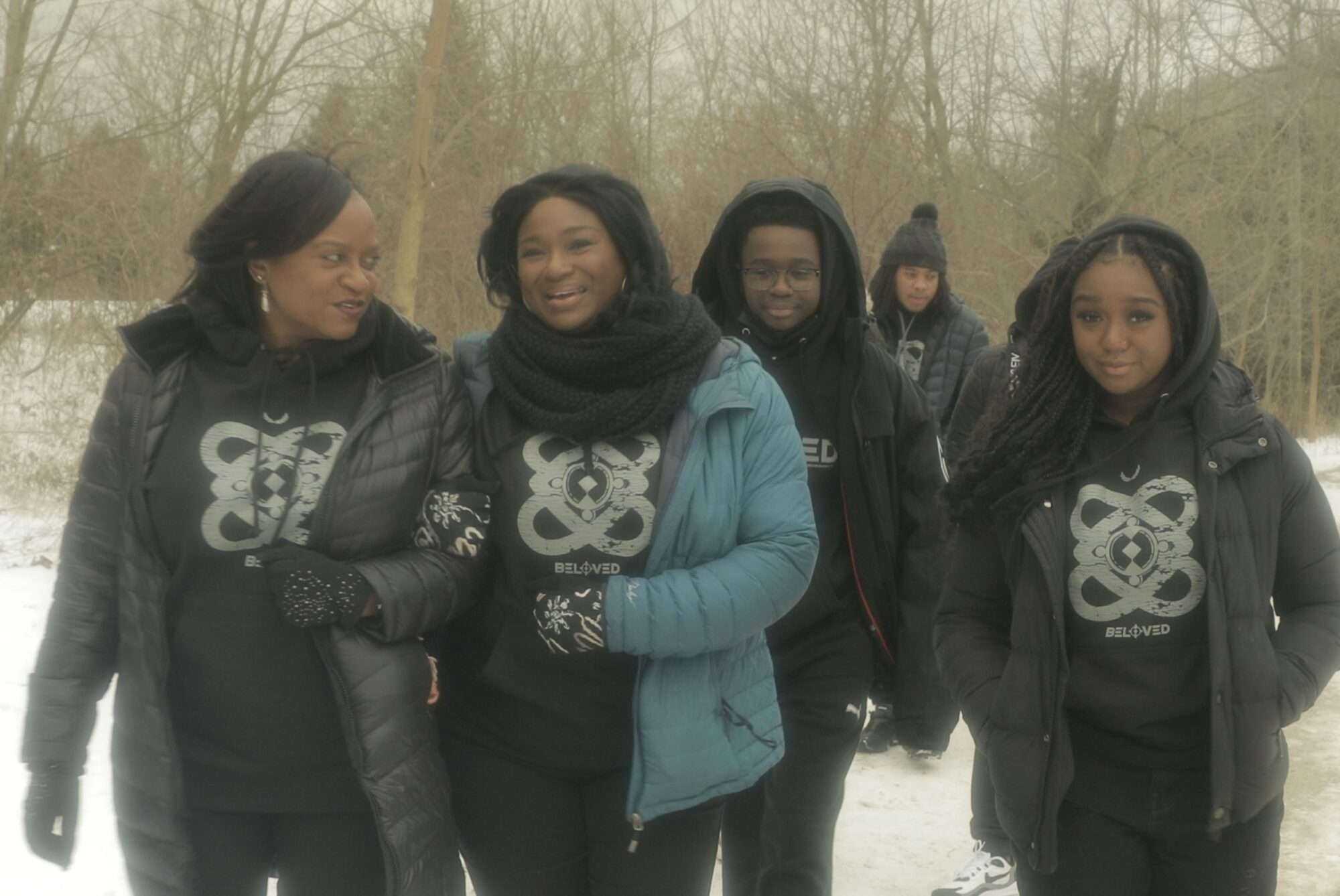on
BY SIMONE J. SMITH
“Dearly Beloved, we are gathered here today, to get through this thing called life.” Nigel Birch Jr.
The trailer was masterfully put together. The opening shot is a powerful looking sister, walking down an alley with artistically spray painted walls. Behind her are two brothers, just far enough to give the Queen her space, but close enough that you can tell if she needed them, they would be there.
Her shirt says one word; BELOVED. In the background, you can hear the voice of Nigel Birch Jr, a creative artist who uses poetry, books, theatre, film and music to express, share, and empower others to find their way back to love. As he speaks the frames change, and viewers are exposed to more and more scenes of black love and unity.
It is the perfect introduction to the critically acclaimed artist and visual communicator Mark Stoddart’s latest project Beloved premiered on Monday February 15th,2021. Mark decided to release it on this date so that it would celebrate both Black History Month and Family Day, sharing the importance of loved ones through art, poetry, music, and positive images of black families.
If 2020 has taught us anything, it’s that family and friends are more important than ever before. Our physical interactions have been removed during this unprecedented time, and Mark’s goal was to find an artitic way for families to engage with our BELOVED ONES and show them how much they mean to us. With this project he wants to showcase families, friends and individuals who are going through pandemic related separation, share their stories of loving from a distance, and provide examples of how they are managing without being able to see these individuals who are closest to them.
Beloved also serves as a tribute to Toni Morrison (author of the Pulitzer Prize winning book of the same title and the first African-American woman to win the Nobel Prize in 1993) whose birthday is on February 18th. Beloved is a beautiful, haunting story that is set around the time following the emancipation declaration. It’s mysterious and supernatural as well as being a love story, a tale of horror, forgiveness, loss and confusion. The book is poetic, full of metaphors and powerful imagery.
Symbolism is also a central theme of the Beloved project. Mark has chosen the Adinkra symbol Nya Gyidie. Its literal meaning is “Faith is the anchor that holds together true bond or love between people.” The symbol is popular amongst the Akan people, who live in the southern regions of Ghana and Ivory Coast in West Africa. It is used as a constant reminder that you can still make it through the most turbulent times in your life provided you hold onto hope and not lose sight of what is important. Mark also had a group of Beloved Ones working ith him on this project:
Nigel Birch Jr.
Nigel Birch Jr. is a writer, poet, host, and mental health advocate. He’s a melting pot of cultural experiences, which can be heard and seen through his artistry. His depth and introspection are felt on every stage and page he touches.
Dj Mercilless
Toronto’s DJ Mercilless is a well-known DJ/producer/engineer who has worked with hip-hop royalty including: Ghostface Killah of Wu-Tang, Benny The Butcher from Griselda, and Styles P of the LOX to name a few.
Rudy Ray
Rudy Ray is a prominent trumpeter based here in Toronto, and is the official trumpet player for the Hip Hop group the Wu-Tang Clan. Rudy is a part of many music projects across genres, including: the BANGERZ Brass, Quincy Morales, and Jump Crew with which he just closed an event for President Barack Obama.
Thompson Egbo-Egbo
Hailing from Toronto, Ontario Thompson Egbo-Egbo is a pianist with a gift for memorable but harmonically complex compositions that have at their core a deep, abiding groove.
In 2018, Egbo-Egbo issued ‘A New Standard’ for eOne, which sought to redefine the concept of the jazz standard, and included original takes on Radiohead, Bob Dylan, and Laura Mvula tunes.
Paul Ohonsi
Paul Ohonsi is a multi-disciplinary artist living in Toronto. Specializing in film, live performance and 3D design, he looks to combine all his skills to tell memorable stories about society and the human experience.
When you do get a chance to check out the website http://www.beloved68.com, you may see a few familiar faces and families:
- Former MP and author Celina Caesar-Chavannes, Dr. Vidal Chavannes and their family
- Community stalwarts Itah Sadhu and Miguel San Vicente, the couple owns the independent black bookstore, A Different Booklist
- Choreographer Esie Mensah, who has danced for Rihanna, Drake and Arcade Fire
- Poet, singer and Regent Park community programmer Trevlyn Kennedy
- Coach, Speaker and Author Danny Stone and Health and Wellness Cityline Expert Trudy E. Stone
- Community champion, youth advocate and founder of the Zero Gun Violence Movement Louis March
Each family was asked to take a picture of their family holding a picture framed of a Beloved One they are unable to see anymore either past or current. They were then asked to create a video of the family in the dining room at the table waiting for dinner to be made. At one the seats or on the table was the picture frame of their BELOVED ONE. Others recorded a video of their family playing a board game or a fun activity together. The families were provided the option to add any other creative ideas that spoke to their typical family interactions.
As usual, Mark has smashed it out the park with this project. You can also get involved by either donating or visiting http://www.beloved68.com if you are interested in showcasing your Beloved One. All donations will be recycled back into the community to support organizations who work tirelessly to ensure that love is felt and seen by all.
Stay in the loop with exclusive news, stories, and insights—delivered straight to your inbox. No fluff, just real content that matters. Sign up today!
We, as humans are guaranteed certain things in life: stressors, taxes, bills and death are the first thoughts that pop to mind. It is not uncommon that many people find a hard time dealing with these daily life stressors, and at times will find themselves losing control over their lives. Simone Jennifer Smith’s great passion is using the gifts that have been given to her, to help educate her clients on how to live meaningful lives. The Hear to Help Team consists of powerfully motivated individuals, who like Simone, see that there is a need in this world; a need for real connection. As the founder and Director of Hear 2 Help, Simone leads a team that goes out into the community day to day, servicing families with their educational, legal and mental health needs.Her dedication shows in her Toronto Caribbean newspaper articles, and in her role as a host on the TCN TV Network.













